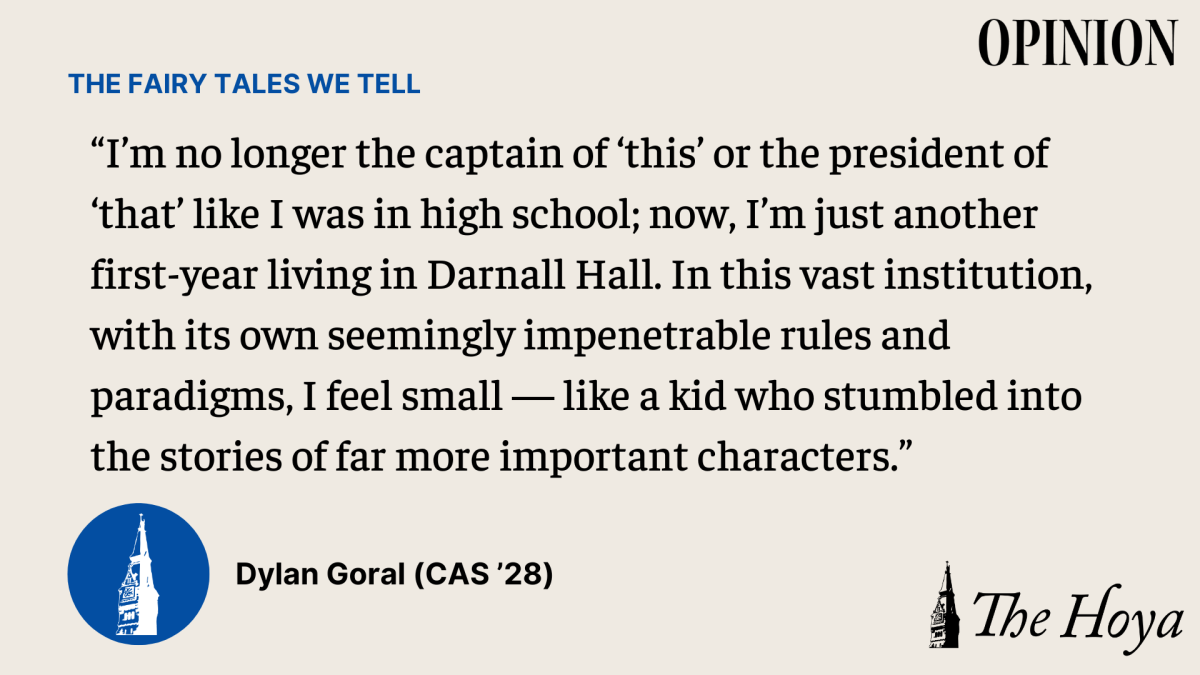
For my birthday last weekend, I received something unusual from one of my closest childhood friends: a picture of us, dated February 2011, posing onstage with a man in a large hat, a woman wearing a giant playing card and someone dressed as a purple cat. Worried I was forgetting an important memory, I made a quick Google search to remind myself who these strange characters were.
It turns out they were characters from Lewis Carroll’s “Alice’s Adventures in Wonderland,” a story that, upon asking a few of my friends, seemed to be a classic in everyone’s childhood — except for mine. After a brief search for a PDF of the book, I was quickly reminded of the story’s plot and central theme of the value of wonder. However, even though I now knew where the characters were from, I was still left wondering what this picture meant or if it was even supposed to mean anything in the first place. My friend, though, had imbued the photograph with meaning through the text accompanying it:
“Hey, I know it’s been forever, but I was going through my mom’s old digital and found this absolute gem. I just thought it was super funny and wanted to send it to you. Also, happy birthday, of course! Not to be overly sentimental or anything, but I know the type of serious person you are and serious place you’re at for school, so I hope you can always remember a bit of Wonderland.”
Just like my memory of that picture, I had forgotten something along the way to growing up: my sense of wonder. I guess my friend already knew that. I had convinced myself there was no place for whimsy or wonder in my life because, in my mind, it wouldn’t get me anywhere. Only the facts and formulas that would help me succeed in school and beyond were worth remembering. Unlike Alice, I couldn’t simply dream things into existence and go on a fantastical journey of self-discovery because that’s not how the world works.
I was particularly defensive of this notion as I arrived at Georgetown University. Well aware of the reputation Georgetown carries, with its low acceptance rate, highly ranked programs and accomplished graduates, I felt like I had to treat this place with utmost seriousness. After all, I had spent my entire high school career pursuing good grades and resume-building activities just to get in. Not making the most of my opportunities at Georgetown almost seemed to discredit all the sacrifices I made to be here.
I feel especially compelled to take this place seriously because, at times, I doubt whether I truly deserve to be here at all. I’m no longer the captain of “this” or the president of “that” like I was in high school; now, I’m just another first-year living in Darnall Hall. In this vast institution, with its own seemingly impenetrable rules and paradigms, I feel small — like a kid who stumbled into the stories of far more important characters.
Reflecting on my first few weeks here — and my friend’s call for me to remember a bit of Wonderland — I realize that I’ve always been in Wonderland, as long as I’m willing to seek it out. To get to Georgetown in the first place, I had to chase a rabbit down a rabbit hole. I left the safety of my “riverside picnic” to follow something elusive, took a chance and tumbled into the unknown. My story wouldn’t be worth telling if I hadn’t at least attempted this journey and embraced its absurdity. I had to wonder what I could be first, to even try — and perhaps, even with my doubts and serious attitude, I’ve had this sense of wonder all along.
It’s this same sense of wonder that has inspired my recent personal challenge to take fewer things so seriously. Of course, my grades still matter, and I take a lot of pride in calling myself a Georgetown student, but I now view my experience here differently. My professor isn’t merely an extension of the red pen that marks my essays, determining my success or failure; he’s someone I’ve played basketball with on the courts at Yates. Healy Hall isn’t just some grand symbol of tradition and serious academia — it’s the backdrop of my first kiss on campus.
We can all uncover these lighter aspects of our lives and create our own Wonderland while we’re here. Your parents might become your Cheshire Cat: the seemingly omnipotent presence that appears in the moments when you find yourself in need of guidance or wisdom. And the guy next door can be your Mad Hatter: Even though you have no idea why he’s yelling at 2 a.m., you put up with him anyway.
You have the people and the place, now go write your fairy tale — just don’t get stuck down a rabbit hole.
Dylan Goral is a first-year student in the College of Arts & Sciences. This is the second installment of his column, “The Fairy Tales We Tell.”